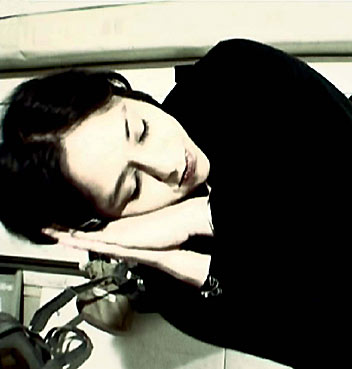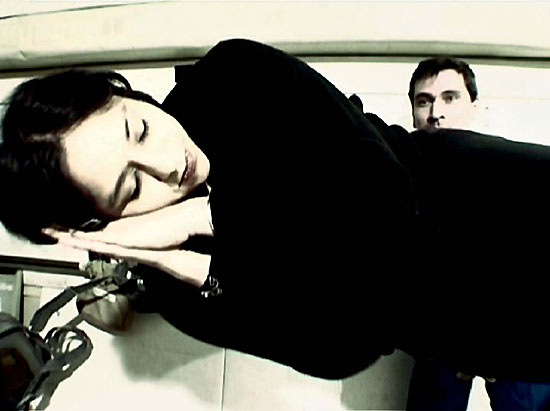

The exhibition applies the working methodology of The Otolith Group in its own making. Interweaving works and source material of very different nature and origins, Thoughtform introduces a complex way of understanding how cinema invents the image and its way of relating to sound, to the narrating voice and to a multitude of other voices that allude to representations.
Museu d'Art Contemporani de Barcelona (MACBA)
The Otolith Group
Thoughtform
4 February – 29 May 2011
Museu d'Art Contemporani de Barcelona (MACBA)
Plaça dels Angels, 1
08001 Barcelona
www.macba.cat
The Otolith Group is a London-based artist collective founded in 2001 by Anjalika Sagar and Kodwo Eshun.
The exhibition applies the working methodology of The Otolith Group in its own making. Interweaving works and source material of very different nature and origins, Thoughtform introduces a complex way of understanding how cinema invents the image and its way of relating to sound, to the narrating voice and to a multitude of other voices that allude to representations. It is possible to imagine how these different ways of creating, re-creating and explaining reality might interrelate and act as a script for a film, constantly incorporating a science-fiction-style of writing. To appeal to the power of fiction in order to express an interest in the past (a past that is not strictly documentary for it contains an infinity of futures, versions of what has already happened or may still happen) seems logical when trying to understand cinema in a completely different way.
Thoughtform testifies to an interest in the ability of thought to give form to ideas. To think implies locating our memory, ordering, interpreting, but above all it implies the creation of a movement that relates the actuality of the present to the actuality of the past, as imagined by each one of us. Thought is full of forms that stem from the relations that different elements establish with one another; forms that comprise families of ideas, arguments, premises, potentialities. Forms that are not ordered in the same way as memory: they have a different temporality, independent of history.
In the eponymous book Thought Forms, published in 1901 and written by Annie Wood Besant (a socialist, feminist and prominent member of the Theosophical Society), and Charles W. Leadbeater, the authors speculate on thought's capacity for changing the real. 'To exist is not enough,' they claim on the last page, 'we desire to live intelligently. But to live we must know, and to know we must study; and here is a vast field open before us…' To think is not the same as to reason; to think implies apprehending the meaning of what lies beyond that which can be expressed in words. The work of The Otolith Group is constantly pointing at this need to widen thought, hence their desire to complicate the task of understanding the work so as to avoid immediate and linear readings.
The imagery that inspires their work comes from different sources, varying from a series of science-fiction posters to a collection of historical photographs of communist delegations in and outside India. Despite their disparity, they help to create a very particular image of the world and give an account of very specific systems of historical and ideological references. And yet the cohabitation of these two worlds is closer to life than the so-called narrative and aesthetic neutrality of the documentary genre, for instance. In this way, the exhibition approximates us to a multiplicity of stories and materials, since it is not a succession of arguments but an opportunity for the viewer to engage in a particular way of thinking: to think through matter-image, matter-sound, matter-memory, matter-narration, matter-emotion; everything can have a plastic quality to which our minds can give form. To understand is to mould what we apprehend with the senses and to shape it in our minds, a shape that will vary for each of us.
We cannot say that science fiction as a genre has had a direct influence on historical events. On the contrary, it offers us the possibility to imagine time against all common sense and forces us to think about the political, historical and cultural difficulties in imposing our interpretation of history and its 'advances' on societies and cultures that are run by different models. Time as a category is intrinsically linked to theology, to an interpretation of the origins and the ultimate destiny of the being, of a culture.
The work of The Otolith Group alerts us to the importance of methodology. Each work helps to create a movement of speculative rebellion, and we must study each contrasted piece carefully so as not to trivialise the resources. One of their proposals consists in (dis)figuring our understanding of history, in particular the hegemonic power of European colonialism. Far from presenting themselves as interpreters of or commentators upon the past, they propose the impossibility of coherence within the text, of narration as a point of departure. Theirs is a polysemic discourse capable of skirting the question of whether it is really meaningful, of its ultimate significance.
Much remains to be said.
Activities
Friday 4 February, at 7 pm
Anjalika Sagar and Kodwo Eshun (The Otolith Group)
in conversation with Chus Martínez
MACBA Auditorium. Free admission. Limited seating
More information on the activities related to the exhibition is available at www.macba.cat, where you can also find the date of the premiere of the film Hydra Decapita (part two), coproduced by MACBA.
Guided tours (included in the ticket)
Exhibition organised by the Museu d'Art Contemporani de Barcelona (MACBA) and co-produced with MAXXI - Museo nazionale delle arti del XXI secolo, Rome
Exhibition curated by Chus Martínez
Museu d'Art Contemporani de Barcelona
Plaça dels Àngels, 1
08001 Barcelona
www.macba.cat